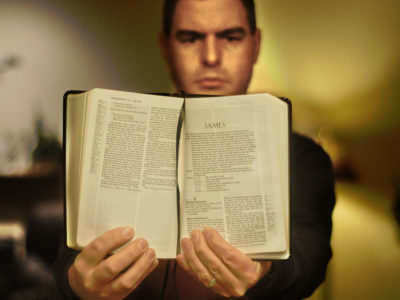CUSTODIANS SHOULD RUN THE CHURCH, as I understand the Bible.
They are the ones with a bucket of water, a rag, and the heart of a servant willing to get down on hands and knees to clean up the mud, the blood, and the beer.
But we give the job to suits.
Like they would get down on their knees when a dry-cleaning bill runs $15.
I know that suits – and the meat inside them – make perfect sense in the world were living in. I’m just not sure how much sense it makes in Kingdom Come.
The Bible Question of the Week is from a Buckeye friend of mine, Angie Brillhart. She gets a free book of mine if she wants one. Here’s Angie’s question:
What should the biblical model of church leadership look like? For instance, should there only be one elder (the pastor), or is there a group of elders in one church that is responsible for mentoring the church and watching out for its spiritual interests/decisions regarding the church.…I’ve heard so many different takes on this….I thought I knew what the right answer was, and now, I’m not sure.
Angie, there’s a reason you’re confused. It’s because you’re getting smarter.
The Bible is confusing. Not on everything. But on this thing.
We read someone else’s mail – Paul writing to churches here and there – and we see his references to church leaders described as elders and deacons, and we wonder what that should have to do with leadership styles in our churches today. Is it a model we should follow?
We want to know “the Bible way of doing things.”
Here’s the problem. Paul and his generation of Christians were still trying to figure out how to run a church.
If church leadership models were babies, in Paul’s day those babies were still in their diapers and pooping in their pants.
Advice from an unmarried preacher
Paul spent a year and a half starting the church in Corinth. But what happened after he left? The people couldn’t figure out who was in charge.
When one of you says, “I’m on Paul’s side,” and another says, “I’m for Apollos,” aren’t you being totally infantile? Who do you think Paul is, anyway? Or Apollos, for that matter? Servants, both of us….We each carried out our servant assignment. I planted the seed, Apollos watered the plants, but God made you grow (1 Corinthians 3:4-6).
And then there was that control freak of a pastor, Diotrephes, who “likes to be the number-one leader, and he won’t pay any attention to us [the disciples of Jesus] (3 John 1:9).
In Paul’s day, he considered himself and the other apostles Top Dogs in the church. “I was not appointed by any group of people or any human authority, but by Jesus Christ himself” (Galatians 1:1).
Apostles were the ones Jesus personally commissioned to get the church ball rolling. Paul and the other apostles started house churches throughout the Roman Empire. He sent Titus to find a few good men who would start churches on the island of Crete. He sent Timothy to lead the congregation at Ephesus, a city on what is now Turkey’s west coast.
For Titus, he wished him a lot of luck finding a few good men on an island full of “liars… and lazy gluttons” (Titus 1:12).
For Timothy, in a city with a lot of opportunity, he gave him advice that may or may not have been tailored just for that situation. And Paul included some pretty ill-informed advice – stuff he would never have said if he had ever cuddled up to a woman and made a baby: “Church officers…. must be in full control of their children and everyone else in their home” (1 Timothy 3:12).
Should we call that part of the biblical model for church leadership?
Those of us with kids might call it a crock.
The only methods I can think of for maintaining full control of my children and everyone in my household would get me arrested and put away for a long time.
Thoughts of a layman
I’m a layman, not an elder. I graduated from seminary, but the last thing I ever wanted to be was an elder, preacher, pastor – or whatever you want to call those people. So I have not given a lot of thought to church leadership models. But I have noticed them, been a part of them, and at times wanted to kick them in a lower body part.
There are a bunch of leadership models throughout the Christian church today. The reason for that diversity is because the Bible is not clear about how to program the details of local church ministry. Heck, church members were meeting in homes for the first three centuries. And here we are trying to figure out who’s going to direct traffic in the parking lot and wondering what the biblical model for that might be.
Paul gave Timothy some great advice about the kind of people he should select to help him lead the church in Ephesus.
For us today, I suspect Paul would say we should take what we can from that letter and skip over what doesn’t apply.
Here’s one thing that doesn’t apply: apostles. The church is no longer led by apostles – eyewitnesses of Jesus Christ.
Beyond that, there’s a lot of debate over how to distinguish elders from deacons, and even if those antiquated titles should be retired or not.
Angie, I know I’m not giving you much to hang your hat on.
But there is one leadership model that’s important. And it’s one you can distinguish – you know it when you see it. And you know it when it’s not there.
Jesus got up, removed his outer garment, and wrapped a towel around his waist. He put some water into a large bowl. Then he began washing his disciples’ feet and drying them with the towel he was wearing….Then he said: Do you understand what I have done….I have set the example, and you should do for each other exactly what I have done for you (John 13:4-15).
When it comes to setting up a leadership model for a local church, maybe we should stop jawing so much about leaders and start looking for servants.
I know. Spoken like a layman.



In my youth, I knew a very wise church leader who would say, “If the pastor is doing everything he should be doing, He (it was usually a he 40 years ago) does not have time to earn a living.” I would agree, but then recall Paul’s decision to remain a tent maker. Different era now, for sure. Church leadership is a bit different in all denominations, but my belief is that modern churches run on business models are simply overwhelming. I would like to see more churches without walls, meeting in private homes or borrowed halls. Brick and mortar consumes too much time and resources. But, this is my morning of digression, should stay on topic here, I know. I will say the Methodist way is pretty good, although the appointee pastor system has its pros and cons.
Thanks, Tom. Yeah, the “Top Dogs appoint the pastor” method seems to keep control within the Preacher Group, which seems to diminish the contribution and considerations of the people who will pay for the pastor…and would be more likely to pick objectively, according to their perceived needs.
Still, even if that’s a control-freak method, as it seems to a layman like me to be, God gets his job done one way or another.
Steve, Please be careful when you say that there are no Apostles in the Church today. Yes, one definition of Apostle is that people who have actually seen Jesus, but an Apostle was a person who has been given a vision by God to reach people the church has not yet reached or has failed to include people in the church who Jesus has called us to. Also, today it is hard to determine who an actual Apostle is for today because too often people who say they have seen Jesus exploit it, but others who may have to not share their fact because of how they may be perceived.
Hi, Gary. Yep, “apostle” has a general meaning of “messenger.” But I think the Apostles of Jesus did a pretty fine job of securing that title for themselves. Kinda like 9/11 got secured to mean what it means. Someone could open up a 9/11 store to sell Survivalist stuff, but their version of 9/11 wouldn’t begin to compare with the real deal. Ditto for Apostles when it comes to folks who adopt the term for themselves today. Why not skip the titles altogether and simply do what we need to do? Call me Steve.